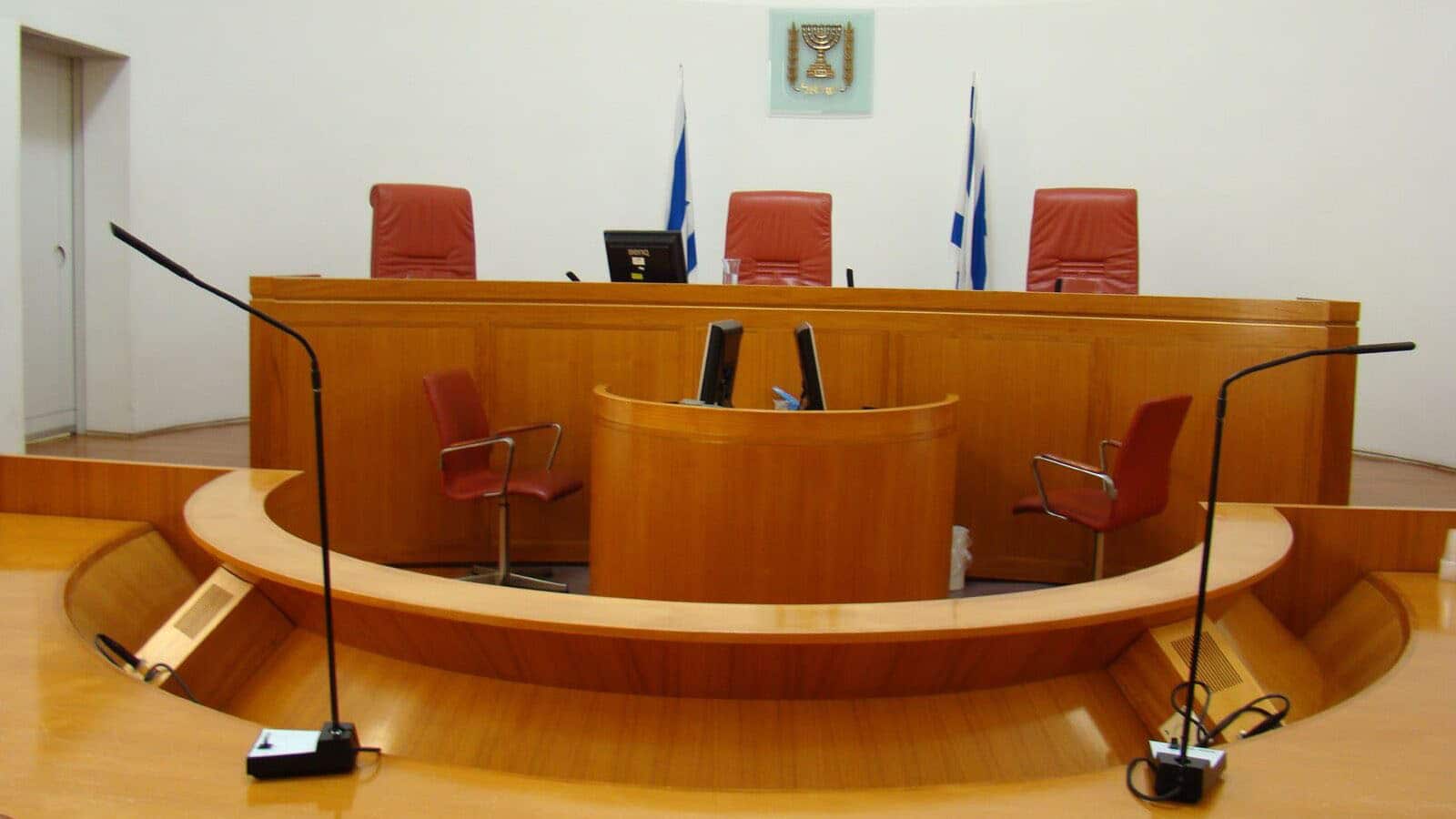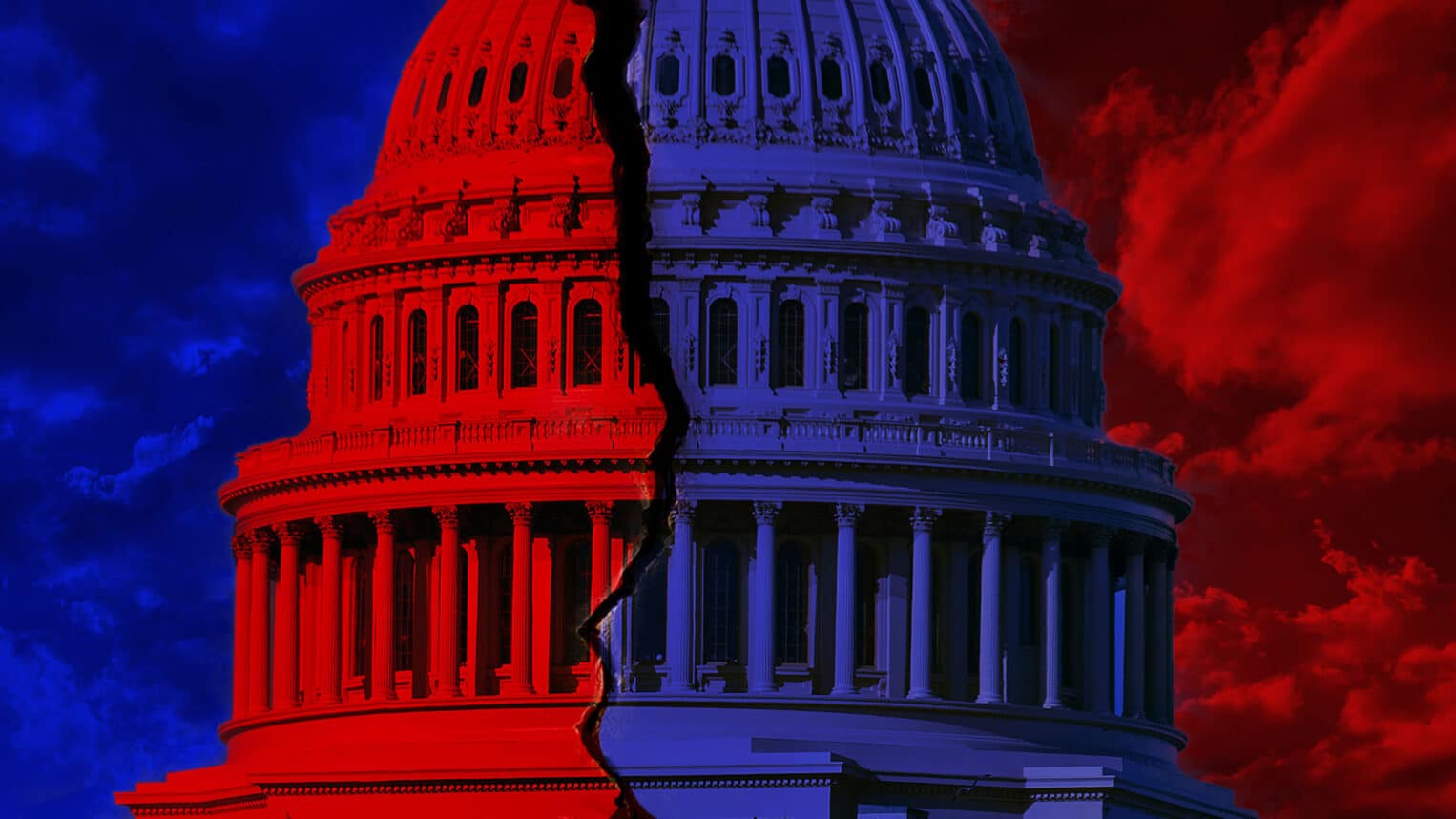 A courtroom in Israel’s Supreme Court building in a photo from 2009. (Antia Gould/Flickr)
A courtroom in Israel’s Supreme Court building in a photo from 2009. (Antia Gould/Flickr)
To read more articles from The Media Line, click here.
Israeli Prime Minister Binyamin Netanyahu was quick to reject a proposal by the country’s president, Isaac Herzog, on the judicial reform legislation that has been roiling the country.
In presenting the “People’s Directive” in a national address on Wednesday evening, Herzog said that Israel is on the cusp of civil war and urged both the government and the opposition to accept his compromise. But minutes after it was made public, Netanyahu said his coalition could not accept its terms.
“Any attempt to reach an agreement is commendable,” he said before departing on a state visit to Germany, adding that: “Central parts of the proposal only perpetuate the current status and do not bring the necessary balance desired between the branches.”
On Thursday, the leaders of five of the opposition parties held a news conference in which they agreed to accept the compromise proposal presented by Herzog, and criticized the opposition for rejecting it out of hand.
The judicial overhaul is the centerpiece of the Netanyahu government, which was sworn in late last year. Since it was announced, the coalition has been swiftly promoting a legislative process that will significantly change the Israeli judicial system. Those in favor of the reforms say they are a necessity in a country in which the courts have accumulated too much clout, often inserting themselves into the political debate and influencing outcomes.
Opponents say the reforms are no less than a constitutional coup aimed at turning Israel into a dictatorship.
Herzog, whose role as president is largely ceremonial, has found himself in the middle of one of Israel’s biggest crises. Initially accused of staying out of the fight, Herzog has spent the last few weeks behind the scenes meeting with academics and politicians from a wide spectrum of the Israeli political arena. Herzog then presented what he called the “People’s Directive” for changes in the judicial system, which includes what he says is an acceptable middle ground for both sides.
While some members of the opposition welcomed Herzog’s proposal, leaders of the protest movement also rejected it as swiftly as Netanyahu.
Here are some of the recommendations laid out in Herzog’s proposal:
JUDICIAL SELECTION COMMITTEE
One of the main differences between the sides is the issue of how judges in Israel are appointed.
Today, there are nine members of the judicial selection committee, which is made up of two government ministers, two members of the Knesset – usually from the opposition, three Supreme Court judges and two lawyers from the Israel Bar Association, which is meant to guarantee neither the government nor the opposition has an automatic majority.
“The current committee is excellent and dictates a consensus between the opposition and the coalition,” said Dr. Amir Fuchs, a senior researcher at the Israel Democracy Institute. “The government now wants complete control over judges in all the courts, over 100 appointments a year.”
The government under its judicial reform plan wants to give the ruling coalition a majority by changing the composition of the nine-member committee to three government ministers, two members of parliament from the coalition, one member of the opposition, the Supreme Court president and two former judges selected by the justice minister. With a simple majority able to select a judge, it is clear the coalition will have the final say in all judicial appointments.
“There will be a dialogue on appointments, but the coalition will be given a majority,” according to attorney Ze’ev Lev, legal counsel for the Movement for Governability and Democracy.
The president’s proposal would place 11 members on the judicial selection committee. This would include the minister of justice and two more government ministers, together with the president of the Supreme Court and two other Supreme Court justices. In addition, there would be one member of parliament from the coalition, and two from different opposition parties on the committee, as well as two representatives of the public who are to be jurists with extensive judicial experience.
“This doesn’t give the judges veto power, but also denies the coalition complete control of the committee,” said Fuchs.
“Essentially, Herzog left the situation untouched and did not address the heart of the problem as perceived by the coalition,” said Lev. “The judges and the opposition will overpower the coalition.”
The government is claiming that the current make-up of the Supreme Court is a members-only club of predominantly males of European descent, part of the country’s intellectual elite. The court has been criticized for underrepresentation of many factions of Israeli society. Meanwhile, critics have pointed out that, aside from one year in which Netanyahu sat in the opposition, Israel’s longest-serving prime minister had time to change the system and diversify the courts.
“Supreme Court judges represent a very specific shade of Israeli society,” said Lev. “They have veto power in the committee and are able to vote out anyone who doesn’t think like them.”
The Herzog proposal also dictates that attention be paid to appointing women and Arabs to the committee.
JUDICIAL REVIEW
The current rules observed by the judicial system allow the Supreme Court to overturn any laws approved by the Knesset.
At the core of the Israeli legislative system are a series of quasi-constitutional Basic Laws adopted in 1992 dealing with fundamental issues. From the role of principle institutes to basic civil liberties, most of the laws can be amended by a simple majority. At the same time, the Supreme Court can overrule laws it believes contradict basic human rights and liberties.
The government’s judicial overhaul would bar the court from deliberating or striking down Basic Laws, stipulating that only a supermajority can cancel laws. In addition, the override clause that has already passed the first of three Knesset votes will basically render the court redundant.
The override clause will allow the Knesset to overrule a court ruling on the legality of a law with a simple majority of 61 members, meaning that any government coalition is inherently stronger than the courts. The parliament will thus be able to bypass judicial oversight of Basic Laws, such as those dealing with fundamental human rights.
“They are trying to minimize the way the Supreme Court interprets human rights,” according to Fuchs. “Laws that contradict equality will be immune and the courts will only be able to strike down a very limited number of explicit laws.”
“The right-wing claims the court does not have the authority to rule on legislation, while the court claims it does,” said Lev. “The reforms want to legislate if and when laws can be struck down by the court and establish supremacy of the legislature in the process.”
The president’s compromise proposal reserves the Supreme Court’s ability to strike down laws that contradict Basic Laws. It also does not allow the Knesset to override court rulings.
Both proposals are seen by each side as a complete plan that cannot be broken down. This is increasingly evident as the details portray how each one of the moves is closely connected to the others.
According to the Herzog outline, the Supreme Court president will continue to be appointed according to seniority. This system is ruled out by the current government.
“The proposal perpetuates the identity of the president of the Supreme Court and, in the eyes of the right wing, this will make any law passed by the right eligible for deletion because of an automatic majority to strike it, and there is no option to override the court’s rulings,” said Lev.
Herzog addresses the issue of introducing new Basic Laws, stipulating that they can only be approved after four readings, rather than the usual three, with an overwhelming majority of 70 to 80 of the 120 Knesset members. The major differences relate to the timing between the readings.
“This obligates a wide consensus on Basic Laws and this is very important because it addresses one of the biggest weaknesses of the constitutional structure in Israel,” Fuchs explained. “Basic Laws are like Play-Doh and can be changed on a whim, based on personal or other interests. This will guarantee stability.”
“In return for this, the proposal cancels any judicial review,” he added.
Coalitions on both sides of the political map have used this plasticity frequently in order to overcome inconvenient political hurdles. But the sitting coalition completely rules out Herzog’s compromise, saying it goes wholly against their will.
“This makes it almost impossible to legislate new Basic Laws,” said Lev. “He is taking the current legislation process to the extreme, poking a finger in the eyes of the coalition without even offering anything in return.”
LEGAL COUNSEL TO THE GOVERNMENT
While the changes to the legal counsel have yet to begin being legislated, they have already caused an uproar among opponents to the government. The current coalition wants to change the status of the legal opinion of the attorney general and the legal counsels of government ministries from binding to non-binding. This will allow ministers, including the prime minister, to act in opposition to the legal advice of the attorney general and hire private lawyers to represent them and their policies in court if needed.
The Herzog proposal allows for the removal of an attorney in the case of a major disagreement with the government or minister, only after the approval of a special committee. It also keeps intact the binding nature of the opinions of the government’s legal counsel.
“The proposal by Herzog here shows no compromise and only makes permanent the current situation,” said Lev.
Fuchs agrees that the Herzog proposal makes little change to the current status of the legal counsel to the government.
This makes compromise between the sides difficult.
“There is no chance for a compromise,” said Fuchs. “When one side seeks absolute power, there is really no room for them to make concessions.”
Under massive public pressure, Netanyahu could decide to soften the judicial reforms or forfeit certain parts.
This can be done unilaterally in an attempt to pacify the opposition and also to avoid a constitutional crisis under which the Supreme Court strikes down the new laws and the Knesset overrides them in response.
In the meantime, the government continues to push the judicial overhaul forward, full speed ahead.
“There was a lot of hope that Herzog’s proposal will lead to a compromise,” said Lev. “The fact that it doesn’t will only speed up the legislation process.”





















 More news and opinions than at a Shabbat dinner, right in your inbox.
More news and opinions than at a Shabbat dinner, right in your inbox.